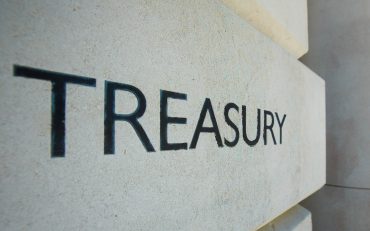
- Bank of England
- Tax Policy
- UK Treasury
UK Faces £20B Treasury Gap with £86B Tech Investment Gamble
6 minute read

UK economy faces weakening growth outlook as Treasury shortfall threatens major technology investment plans
Key Takeaways
- £20bn fiscal shortfall looms as the Office for Budget Responsibility prepares to revise economic forecasts downward, threatening Chancellor Rachel Reeves’s tax policies after last year’s £40bn budget increase.
- Labour support crashes to 20% in YouGov polling, the party’s lowest level in five years and eight points behind Reform UK, intensifying pressure on Reeves ahead of potential November budget.
- £86bn technology investment package launched targeting AI, digital transformation, and life sciences as government pivots economic strategy toward tech-driven productivity growth.
Introduction
Chancellor Rachel Reeves confronts mounting fiscal pressures as the Treasury faces a potential £20-25 billion shortfall from revised economic forecasts. The Office for Budget Responsibility’s upcoming model adjustments present a less optimistic productivity outlook, creating significant headwinds for the Chancellor’s economic strategy.
Reeves returns to the political spotlight with Labour’s poll numbers at their lowest point in five years, registering just 20% support according to The Guardian. The dramatic polling decline places additional strain on her efforts to stabilize the UK’s tax system without triggering market instability or further eroding public confidence.
The Chancellor’s challenge intensifies as debt interest costs exceed £100 billion annually, forcing her to balance fiscal responsibility with economic growth objectives. Her decisions carry implications for both Labour’s political survival and the UK’s broader economic trajectory.

Key Developments
The Treasury has committed £86 billion toward science and technology initiatives, marking a decisive shift toward digital transformation as the cornerstone of economic renewal. This package targets life sciences, advanced manufacturing, and defence sectors as primary growth drivers.
A £3.25 billion Transformation Fund forms the centerpiece of public service reform efforts, focusing on AI adoption and civil service efficiency improvements. The initiative includes digitising HMRC operations to tackle tax avoidance and streamline revenue collection processes.
Reeves has enlisted former pensions minister Torsten Bell to explore radical tax reforms, particularly targeting unearned income and property wealth taxation. This appointment signals the Chancellor’s openness to substantial structural changes in the UK’s tax framework.
The government has delayed budget timing until November, providing additional preparation time as speculation grows around potential tax increases. This delay reflects the complexity of balancing fiscal constraints with political considerations ahead of crucial policy announcements.
Market Impact
UK fintech investment dropped 37% in 2024, prompting government intervention through enhanced support for scale-ups and Regional Innovation Clusters. The decline underscores broader challenges facing the technology sector amid economic uncertainty.
Financial markets remain cautious as debt servicing costs strain public finances, with investors monitoring potential tax policy changes. The Chancellor must present reforms that address fiscal deficits without triggering inflationary pressures or stifling growth.
Public investment plans target 2.3% annual real-term increases, reaching £113 billion by 2030. Research and development funding aims for £22.5 billion by 2029/30, representing substantial commitment to long-term productivity enhancement.
Strategic Insights
The government’s technology-focused strategy positions AI and digital transformation as central to economic competitiveness. This approach reflects recognition that traditional productivity models require fundamental restructuring to address contemporary challenges.
Labour’s polling decline to eight points behind Reform UK creates political urgency around economic messaging and policy delivery. The party’s credibility depends heavily on Reeves’s ability to demonstrate competent fiscal management while addressing public concerns.
Internal party dynamics add complexity as Prime Minister Keir Starmer incorporates new economic advisors, including Minouche Shafik and Dan York-Smith. This hands-on approach from Number 10 suggests potential tension between the Chancellor and Prime Minister over economic direction.
The Northern Powerhouse Rail and other infrastructure projects benefit from revised fiscal rules, indicating government commitment to investment-led growth despite budgetary constraints.

Expert Opinions and Data
Reeves emphasizes that “if renewal is our mission and productivity is our challenge, then investment and reform are our tools,” highlighting her focus on structural economic transformation. The Chancellor’s approach prioritizes long-term productivity gains over short-term fiscal adjustments.
Former shadow chancellor Anneliese Dodds advocates for wealth tax implementation to address public finance gaps, though Reeves maintains current taxation balance is appropriate. “I think we’ve got the balance right in terms of how we tax those with the broadest shoulders,” Reeves states, referencing higher levies on private jets and second homes.
Economic experts suggest the fiscal shortfall may exceed £40 billion due to economic slowdown and persistent inflation. This projection complicates Reeves’s task of avoiding fiscal rule breaches while maintaining market confidence.
Business leaders express cautious optimism about technology investments while voicing concerns about surviving increased tax pressures. The tension between growth investment and immediate fiscal demands creates uncertainty for private sector planning.
Conclusion
Rachel Reeves faces a critical juncture that will define both her chancellorship and Labour’s electoral prospects. The convergence of fiscal pressures, political challenges, and economic transformation demands creates an environment where bold action carries both significant risks and potential rewards.
The Chancellor’s technology-focused investment strategy represents a substantial bet on digital transformation driving productivity growth. Success requires navigating complex political dynamics while maintaining market confidence amid deteriorating poll numbers and mounting fiscal constraints.
The November budget timeline provides Reeves with crucial preparation time to balance competing demands from markets, voters, and party colleagues. Her ability to present coherent tax reforms while addressing the £20 billion shortfall will determine whether Labour can rebuild credibility as a government-in-waiting.








